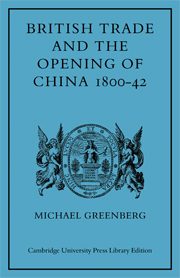Book contents
- Frontmatter
- Contents
- Money, Weights and Abbreviations
- Author's Preface
- CHAPTER I THE OLD CHINA TRADE
- CHAPTER II THE HONOURABLE COMPANY AND THE PRIVATE ENGLISH
- CHAPTER III THE CANTON COMMERCIAL SYSTEM
- CHAPTER IV THE DEVELOPMENT OF THE CANTON TRADE TO 1834
- CHAPTER V OPIUM
- CHAPTER VI BUSINESS AND FINANCIAL ORGANISATION
- CHAPTER VII THE VICTORY OF THE FREE TRADERS
- CHAPTER VIII LEDGER AND SWORD
- APPENDICES
- Bibliography
- Index
CHAPTER II - THE HONOURABLE COMPANY AND THE PRIVATE ENGLISH
Published online by Cambridge University Press: 07 October 2011
- Frontmatter
- Contents
- Money, Weights and Abbreviations
- Author's Preface
- CHAPTER I THE OLD CHINA TRADE
- CHAPTER II THE HONOURABLE COMPANY AND THE PRIVATE ENGLISH
- CHAPTER III THE CANTON COMMERCIAL SYSTEM
- CHAPTER IV THE DEVELOPMENT OF THE CANTON TRADE TO 1834
- CHAPTER V OPIUM
- CHAPTER VI BUSINESS AND FINANCIAL ORGANISATION
- CHAPTER VII THE VICTORY OF THE FREE TRADERS
- CHAPTER VIII LEDGER AND SWORD
- APPENDICES
- Bibliography
- Index
Summary
A community of British merchants in China could only emerge in opposition to the most powerful commercial unit of the time, the Honourable East India Company. Until 1834 ‘the sole exclusive right of trading, trafficking and using the business of merchandize into or from the dominions of the Emperor of China’ was, as far as British subjects were concerned, legally vested in the Company. Even after 1813, when the India trade was practically thrown open to private British merchants, the Company jealously guarded its monopoly of the China trade. It was the policy of the Court of Directors, who managed the affairs of the Company from London, to safeguard this monopoly by preventing any ‘free merchant’ from taking up his residence in China. Only its own agents, the Supercargoes at its Canton ‘Factory’, that is, its establishment of ‘factors’ or agents, were to remain in China.
A Supercargo, in the 18th century, was an officer aboard a merchant ship whose duty it was to superintend the cargo and commercial transactions of the voyage. But the term came to be used, rather loosely, of an agent who managed a merchant's business in a foreign country. The shift in the connotation of the word expressed the changing function of the agent. From 1770 the Company's Supercargoes were no longer ordered to return in the ships in which they were specifically interested, but to form themselves into a single body which should remain in China from year to year.
- Type
- Chapter
- Information
- British Trade and the Opening of China 1800–42 , pp. 18 - 40Publisher: Cambridge University PressPrint publication year: 1970
- 1
- Cited by



